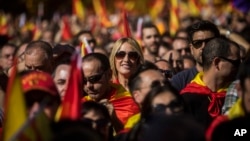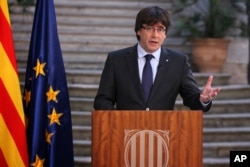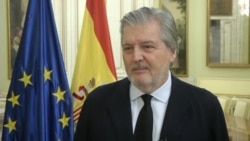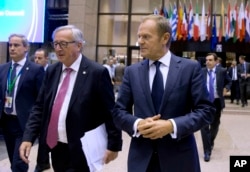Hundreds of thousands of supporters of a united Spain took to the streets of Barcelona Sunday to voice their rejection of Catalonia’s declaration of independence.
Chanting "Viva Espana" and waving Spanish, Catalan and European Union flags, the protesters marched in Catalonia's capital to show they supported the Spanish central government's dismissal of Catalonia's cabinet and quashing of the region's secession push.
Protesters also held banners reading, “We won't let Spain be torn apart into pieces'' and `”The awakening of a silenced nation,'' among others.
“We have organized ourselves late, but we are here to show that there is a majority of Catalans that are no longer silent and that no longer want to be silenced,'' said Alex Ramos, head of the pro-union Catalan Civil Society.
Organizers said the rally attracted more than 1 million people, but police put the figure at 300,000.
Spanish Prime Minister Mariano Rajoy dissolved Catalonia's parliament, just hours after the regional body voted Friday in favor of independence from Spain.
In addition to dismissing the regional parliament, Rajoy has called for snap Catalan elections on December 21 and has stripped Catalonia's most senior police officials of their powers.
Inigo Méndez de Vigo, a spokesman for the Spanish government, said Puigdemont and all other Catalonian leaders will be eligible to run in the December election.
“We are giving the voice to the Catalans in a legal and free elections, not so-called referendum which is outside the law,” he said. “So, this is the way of telling the Catalans, if you want to vote, you have the right to vote, do it under the conditions of the law and freely.”
WATCH: Spanish official: 'Giving the voice to the Catalans'
The resolution to secede from Spain was drafted and presented by the more radical separatist factions of the regional coalition headed by Puigdemont, and it passed with 70 votes in favor, 10 against and 2 blank votes.
Friday's resolution by the Catalan regional parliament ends a period of uncertainty over Catalan independence that has prevailed since an October 1 referendum on independence that won 90 percent of the vote in a 50 percent voter turnout.
Puigdemont could face a 25-year prison sentence for sedition. The central government already has jailed two separatist leaders and is prosecuting other officials accused of using public resources to support the independence bid.
Belgium's Asylum and Migration minister, said his country could offer Puigdemont asylum. Theo Francken said on Twitter Sunday that independent asylum authorities would make the final decision about whether to grant asylum to the deposed leader.
World reaction
De Vigo said Europeans “do not want any new nationalism,” and he pointed out that no foreign nations had yet recognized an independent Catalonia.
“We know what in history nationalism has meant to Europe. So, I think it is a very positive reaction,” he said.
The United Nations spokesperson urged all sides “to seek solutions within the framework of the Spanish constitution and through established political and legal channels.”
The European Union Council President Donald Tusk, who has supported Madrid’s approach to the crisis, said on Twitter he hoped “the Spanish government favors force of argument, not argument of force.”
European Union President Jean-Claude Juncker echoed the sentiment, saying “there isn't room in Europe for other fractures or other cracks. We've had enough of those.”
NATO, of which Spain is a member, said in a statement, “The Catalonia issue is a domestic matter which should be resolved within Spain’s constitutional order.”
Even regional authorities in the traditionally nationalistic Basque region have been reluctant to support the Catalan cause, despite growing relations between radical separatists in both regions.
Madrid’s efforts to keep the country united also have the continued support of the U.S. government. U.S. State Department spokeswoman Heather Nauert said in a statement, “… the United States supports the Spanish government’s constitutional measures to keep Spain strong and united.”
Russian involvement
Some international support for Catalan independence, however, seems to be coming from Russia, which is giving some recognition to Catalan separatists as reciprocal action for past U.S. and European backing to breakaway former Soviet republics and the controversial independence of Kosovo.
“By backing the independence of Kosovo, formed and prosperous countries such as Spain put at risk their own fragile stability,” Russian President Vladimir Putin said last week at an international forum in Sochi.
"It's undeniable that Putin is interested in the destabilization and balkanization of Spain," a senior Spanish diplomat told VOA, asking that his name not be used.
The de facto foreign minister of the Russian supported breakaway state of South Osetia, Dimitri Medoev, who is reported to be close to the Kremlin, visited Catalonia this week to set up an “interests office” in Barcelona to promote “bilateral relations in humanitarian and cultural issues."
South Osetia pledged support for the “sovereignty of Catalonia” following the October 1 referendum.
Rogue states such as Venezuela and North Korea also have expressed support for Catalonian secessionism.
Martin Arostegui in Barcelona contributed to this report.
















